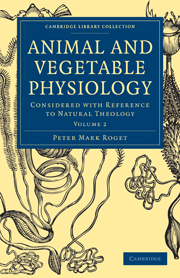Book contents
- Frontmatter
- Contents
- PART II THE VITAL FUNCTIONS
- CHAPTER I OBJECTS OF NUTRITION
- CHAPTER II NUTRITION IN VEGETABLES
- CHAPTER III ANIMAL NUTRITION IN GENERAL
- CHAPTER IV NUTRITION IN THE LOWER ORDERS OF ANIMALS
- CHAPTER V NUTRITION IN THE HIGHER ORDERS OF ANIMALS
- CHAPTER VI PREPARATION OF FOOD
- CHAPTER VII DIGESTION
- CHAPTER VIII CHYLIFICATION
- CHAPTER IX LACTEAL ABSORPTION
- CHAPTER X CIRCULATION
- CHAPTER XI RESPIRATION
- CHAPTER XII SECRETION
- CHAPTER XIII ABSORPTION
- CHAPTER XIV NERVOUS POWER
- PART III THE SENSORIAL FUNCTIONS
- PART IV THE REPRODUCTIVE FUNCTIONS
- INDEX
CHAPTER III - ANIMAL NUTRITION IN GENERAL
Published online by Cambridge University Press: 05 October 2010
- Frontmatter
- Contents
- PART II THE VITAL FUNCTIONS
- CHAPTER I OBJECTS OF NUTRITION
- CHAPTER II NUTRITION IN VEGETABLES
- CHAPTER III ANIMAL NUTRITION IN GENERAL
- CHAPTER IV NUTRITION IN THE LOWER ORDERS OF ANIMALS
- CHAPTER V NUTRITION IN THE HIGHER ORDERS OF ANIMALS
- CHAPTER VI PREPARATION OF FOOD
- CHAPTER VII DIGESTION
- CHAPTER VIII CHYLIFICATION
- CHAPTER IX LACTEAL ABSORPTION
- CHAPTER X CIRCULATION
- CHAPTER XI RESPIRATION
- CHAPTER XII SECRETION
- CHAPTER XIII ABSORPTION
- CHAPTER XIV NERVOUS POWER
- PART III THE SENSORIAL FUNCTIONS
- PART IV THE REPRODUCTIVE FUNCTIONS
- INDEX
Summary
Food of Animals.
Nutrition constitutes no less important a part of the animal, than of the vegetable economy. Endowed with more energetic powers, and enjoying a wider range of action, animals, compared with plants, require a considerably larger supply of nutritive materials for their sustenance, and for the exercise of their various and higher faculties. The materials of animal nutrition must, in all cases, have previously been combined in a peculiar mode; which the powers of organization alone can effect. In the conversion of vegetable into animal matter, the principal changes in chemical composition which the former undergoes, are, first, the abstraction of a certain proportion of carbon; and secondly, the addition of nitrogen. Other changes, however, less easily appreciable, though perhaps as important as the former, take place, in greater quantity, with regard to the proportions of saline earthy, and metallic ingredients; all of which, and more especially iron, exist in greater quantity in animal than in vegetable bodies. The former also contain a larger proportion of sulphur and phosphorus than the latter.
The equitable mode in which nature dispenses to her innumerable offspring the food she has provided for their subsistence, apportioning to each the quantity and the kind most consonant to enlarged views of prospective beneficence, is calculated to excite our highest wonder and admiration.
- Type
- Chapter
- Information
- Animal and Vegetable PhysiologyConsidered with Reference to Natural Theology, pp. 57 - 73Publisher: Cambridge University PressPrint publication year: 2009First published in: 1834



